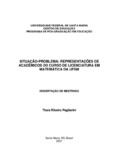| dc.creator | Pagliarini, Thaís Ribeiro | |
| dc.date.accessioned | 2007-07-12 | |
| dc.date.available | 2007-07-12 | |
| dc.date.issued | 2007-01-15 | |
| dc.identifier.citation | PAGLIARINI, Thaís Ribeiro. Problem-situations: representations from the academics of the Mathematics Degree course at UFSM. 2007. 122 f. Dissertação (Mestrado em Educação) - Universidade Federal de Santa Maria, Santa Maria, 2007. | por |
| dc.identifier.uri | http://repositorio.ufsm.br/handle/1/7201 | |
| dc.description.abstract | Although the term problem is greatly present in the daily routine of people who work with Mathematics, we can perceive, even nowadays, that its use is not always followed by a conscious understanding about its meaning. Taking this point into consideration, this research, which is linked to the UFSM Education Post-Graduation Program, introduced at the
research area Curriculum, Teaching and School Practices, aims at studying UFSM Mathematics Degree Course undergraduate students representations about Problemsituations, as well as to investigate such representations having in mind the undergraduate formative way and the signals of the topic in the prescriptive to their future teaching practice. The methodology has a quantitative and qualitative character, happening in two different moments. At first, we will show percent data of the answers obtained, after that we will analyze from the elaborated categories, such as (1) the understanding about the Problemsituations by the Mathematics undergraduate students; (2) the Mathematics undergraduate students formation in their Mathematics Degree Course in terms of Problem-situations; (3) the importance given by the Mathematics undergraduate students to the Problem-situations; (4) types of Problem-situations solved by the Mathematics undergraduate students and (5) the feasibility seen by the undergraduate students in working with Problem-situations at schools. It is from this organization that we present the undergraduate students perceptions and the research results. Using the five categories, in order to make a cross-answer given as a theoretical reference, observing that the public politics and the implementation of suggestions proposed for them were out of all proportion, as well as the lack of knowledge from the academics about the problem-situations dynamics | eng |
| dc.format | application/pdf | por |
| dc.language | por | por |
| dc.publisher | Universidade Federal de Santa Maria | por |
| dc.rights | Acesso Aberto | por |
| dc.subject | Situação-problema | por |
| dc.subject | Currículo | por |
| dc.subject | Práticas pedagógicas | por |
| dc.subject | Ensino de matemática | por |
| dc.subject | Problem-situations | eng |
| dc.subject | Curriculum | eng |
| dc.subject | Educative practices | eng |
| dc.subject | Mathematics-teaching | eng |
| dc.title | Situação-problema: representações de acadêmicos do curso de Licenciatura em Matemática da UFSM | por |
| dc.title.alternative | Problem-situations: representations from the
academics of the Mathematics Degree course at UFSM | eng |
| dc.type | Dissertação | por |
| dc.description.resumo | Embora o termo problema esteja bastante presente no cotidiano de pessoas que trabalham com a Matemática, ainda hoje, podemos perceber que seu uso nem sempre está
acompanhado de um consciente entendimento sobre o seu significado. Diante disso, este trabalho de pesquisa que está vinculado ao Programa de Pós-Graduação em Educação da
UFSM, inserido na Linha de Pesquisa, Currículo, Ensino e Práticas Escolares tem como temática de estudo as representações de acadêmicos do Curso de Licenciatura em
Matemática da UFSM sobre Situações-Problema e tem por objetivo investigar tais representações tendo em vista a trajetória formativa desses acadêmicos e a sinalização do
tema nas normativas à sua futura prática docente. A metodologia é de cunho quantiqualitativo, ocorrendo em dois momentos distintos. Num primeiro momento buscaremos
mostrar dados percentuais das respostas obtidas, em seguida faremos uma análise a partir das categorias elaboradas, a saber: (1) entendimento a respeito de Situações-Problema
pelos acadêmicos do Curso de Licenciatura em Matemática; (2) formação dos acadêmicos do Curso de Licenciatura em Matemática em termos de Situações-Problema; (3) importância
dada pelos acadêmicos do Curso de Licenciatura em Matemática a Situações-Problema; (4) tipo de Situações-Problema trabalhadas pelos acadêmicos do Curso de Licenciatura em Matemática e (5) viabilidade vista pelos acadêmicos do Curso de Licenciatura em Matemática para se trabalhar com Situações-Problema nas escolas. Usando as cinco categorias, buscamos fazer um cruzamento das respostas dadas com o referencial teórico, observando o descompasso entre as políticas públicas e a implementação das sugestões por elas propostas, bem como o desconhecimento dos acadêmicos sobre a dinâmica de
Situações-Problema | por |
| dc.contributor.advisor1 | Freitas, Deisi Sangoi | |
| dc.contributor.advisor1Lattes | http://lattes.cnpq.br/1136434717168776 | por |
| dc.contributor.referee1 | Auler, Décio | |
| dc.contributor.referee1Lattes | http://lattes.cnpq.br/5197105723843870 | por |
| dc.contributor.referee2 | Rays, Oswaldo Alonso | |
| dc.contributor.referee2Lattes | http://lattes.cnpq.br/7733901266140847 | por |
| dc.creator.Lattes | http://lattes.cnpq.br/2642560854143604 | por |
| dc.publisher.country | BR | por |
| dc.publisher.department | Educação | por |
| dc.publisher.initials | UFSM | por |
| dc.publisher.program | Programa de Pós-Graduação em Educação | por |
| dc.subject.cnpq | CNPQ::CIENCIAS HUMANAS::EDUCACAO | por |


